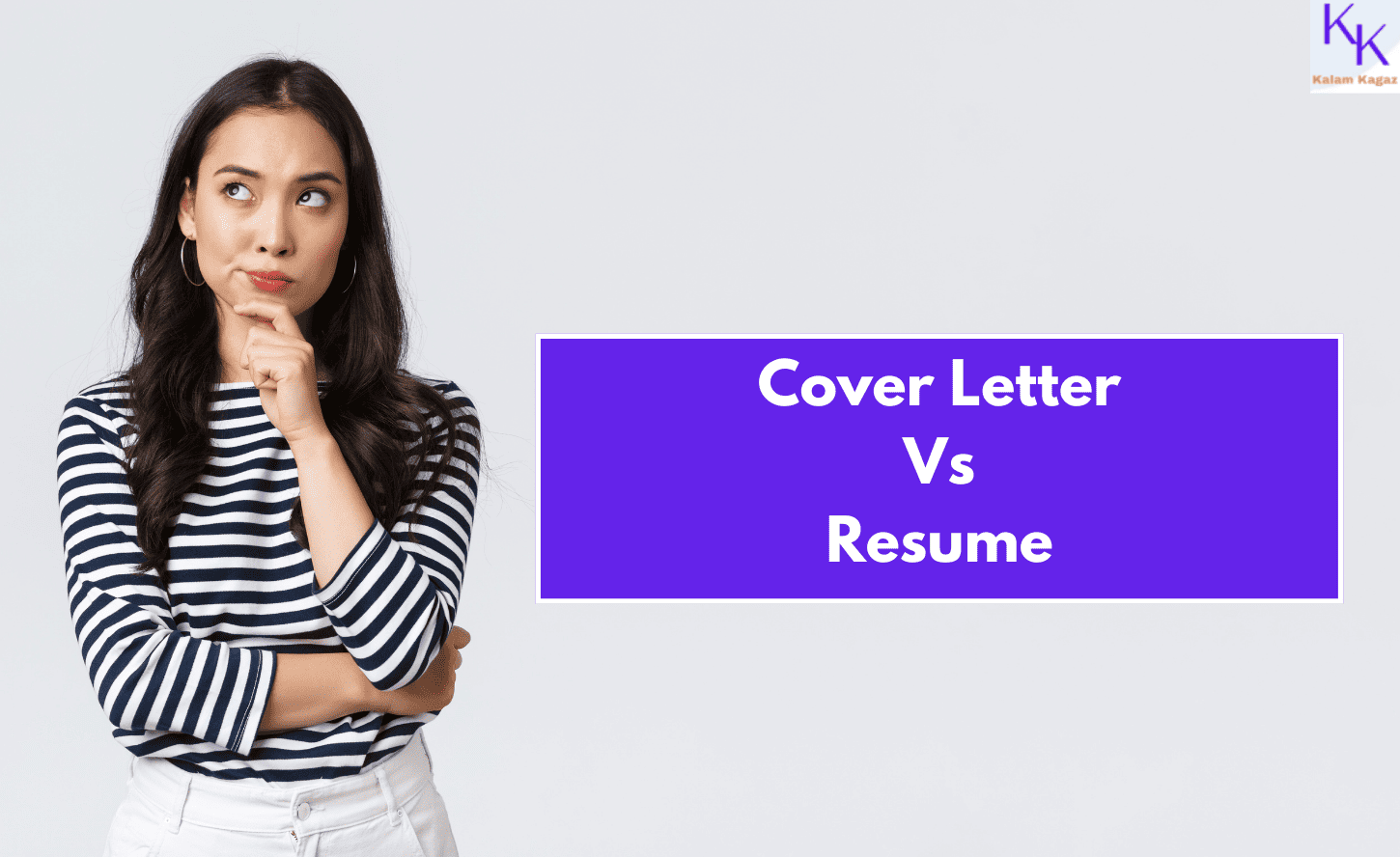- December 5, 2024
- by Kalam Kagaz
- Cover Letter Writing, Resume Writing
Job hunting can feel like preparing for a big audition. You want to make the right impression, stand out, and land the role. Your cover letter and resume are your opening act and highlight reel, each with a unique purpose. But understanding how to use them effectively can be the difference between landing your dream job or waiting in the wings.
Think of your cover letter and resume as Batman and Robin—a powerhouse duo that works better together. While the resume lays out the facts, the cover letter adds the story, making your application a compelling package.
In this blog, we’ll compare cover letters and resumes, exploring their differences, purposes, and how to write them for success.
Cover Letter vs Resume
Both a cover letter and a resume are essential documents in the job application process, but they serve distinct purposes and differ in format, content, and tone.
Cover Letter vs Resume
| Aspect | Cover Letter | Resume |
|---|---|---|
| Purpose | To explain your suitability. | To summarize your career history. |
| Tone | Personal and persuasive. | Professional and objective. |
| Content | Tailored examples and achievements. | A broad overview of skills and jobs. |
| Length | One page | One to two pages. |
| Uses | Job and university applications | Most job applications |
What is a Cover Letter?
A cover letter is a personalized document that accompanies your resume. It highlights your interest in the role and explains how your skills and experiences align with the job. It’s your chance to tell the employer why you’re the perfect fit.
Key features:
- Typically one page long.
- Tailored to the specific job and company.
- Written in a conversational yet professional tone.
What is a Resume?
A resume is a concise summary of your professional history, showcasing your skills, experience, and achievements. Think of it as a snapshot of your career highlights.
Key features:
- One to two pages long.
- Focused on listing factual details (e.g., job titles, responsibilities, and dates).
- Uses bullet points for easy scanning.
What Does A Cover Letter and Resume Cover?
Cover Letter Elements
- Header: Your contact details and the recipient’s details.
- Opening: A compelling introduction expressing interest.
- Body: Highlight relevant skills and achievements.
- Closing: Gratitude and a call to action.
Resume Elements
- Contact Information: Name, email, phone number, and LinkedIn profile.
- Professional Summary: A brief introduction to your career.
- Experience: Job history with accomplishments.
- Education: Degrees and certifications.
- Skills: Key competencies relevant to the job.
When To Use A Cover Letter vs Resume
Are Cover Letters Always Necessary?
Not all jobs require a cover letter, but submitting one can set you apart. It’s particularly useful when:
- The job description explicitly requests it.
- You want to explain a career gap or career change.
- You’re particularly passionate about the role.
Examples of Effective Use
For creative roles, a cover letter can showcase personality, while the resume sticks to the facts. In technical roles, the resume lists certifications and projects, while the cover letter explains their relevance.
CV vs Cover Letter vs Resume: What’s the Difference?
- CV (Curriculum Vitae): A detailed academic document used mainly for academic or research roles. It can span multiple pages.
- Resume: A concise summary of work experience and skills, typically used in the corporate world.
- Cover Letter: A tailored introduction to the resume, explaining its relevance.
Tips for Writing an Effective Cover Letter and Resume
- Tailor to the Job: Use keywords from the job description.
- Be Concise: Stick to relevant skills and achievements.
- Avoid Redundancy: Don’t repeat your resume in your cover letter.
- Proofread: Spelling errors can cost you the job.
Conclusion: A Dynamic Duo
At the end of the day, your cover letter and resume are like peanut butter and jelly—they’re better together. While the resume provides substance, the cover letter adds flavor and context. Together, they form a complete picture of your professional story, showcasing both your accomplishments and your personality.
By mastering both, you’re not just another applicant; you’re a standout. So, take the time to perfect these documents, customize them to the job, and confidently submit your application.
Common Questions About Cover Letters and Resumes
Is a Cover Letter Better Than a Resume?
No, but they complement each other. A resume showcases your qualifications, while a cover letter explains why you’re the right fit.
Is a CV a Resume and Cover Letter?
No, a CV is a detailed academic record, separate from both a resume and a cover letter.
Does a Cover Letter Count as a Resume?
No, a cover letter is a supplementary document that explains your resume.
Is a Cover Letter Separate From a Resume?
Yes, the cover letter and resume serve different purposes and are submitted as separate documents.
Should I Submit Both Resume and Cover Letter?
Yes, unless the job posting specifies otherwise. Submitting both shows professionalism and effort.






